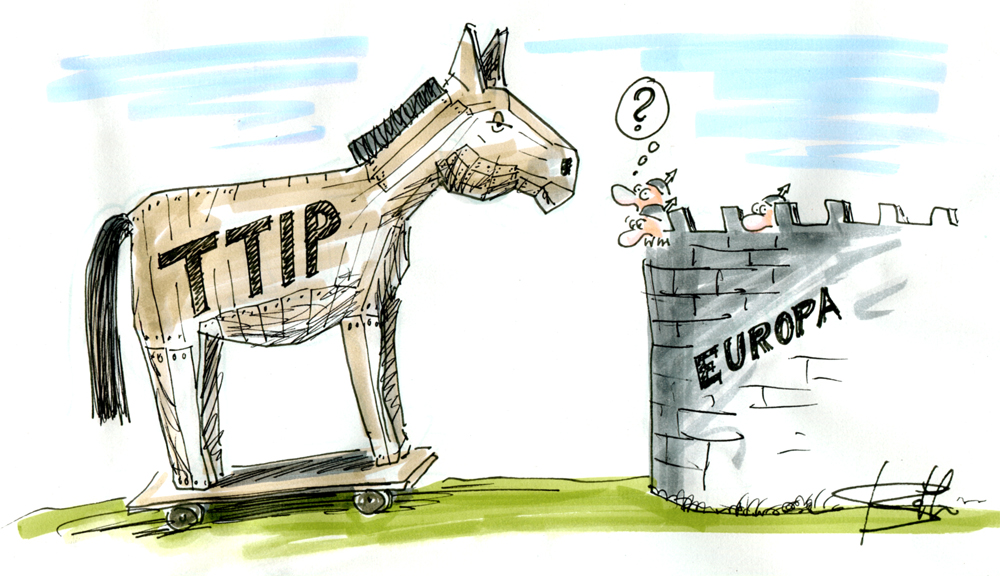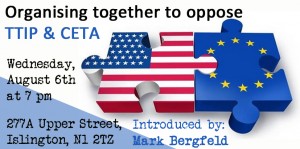TTIP: Trojan Horse for privatisation
by Linda Kaucher
As awareness of the US/EU free trade agreement (TTIP – Trade and Investment Partnership) grows, so does resistance to it.
This ‘trade’ deal is not about trade but about deregulation, increasing the rights and power of transnational corporations while decreasing democratic control over their activities.
A central part of the deal will be a committee set up to make sure that all new US and EU regulations are ‘harmonised’, with big business at the table to ensure that it’s the lowest possible regulation. Yet it is these regulations, such as on food and chemical safety and on environmental protection, that protect us from corporations.
Another main aspect of the deal is ‘Investor/State Dispute Settlement’ (ISDS) allowing corporations to sue elected governments for any regulatory action that negatively affects future corporate profits. Rather than in national courts, these cases will be heard by ad hoc arbitration panels – 3 trade lawyers for whom hearing such cases, pursuing them for client corporations or defending governments is a highly-profitable revolving door.
Where ISDS is already in agreements globally, it is financially challenging government regulations, leading to big payouts from the public purse to transnational corporations or having a ‘chilling effect’, with politicians afraid to legislate.
Currently, Canadian Lone Pine is using its US subsidiary to sue to sue Quebec for its fracking ban, El Salvador is being sued by Australian/Canadian gold mining firm Pacific Rim for trying to protect its main water supply from contamination, the German government is being sued by Swedish nuclear power company Vattenfall for phasing out nuclear power, and the Egyptian government has been sued by Veolia for increasing the minimum wage.
Do we want this?
 In response to a recent EU Trade Commission public consultation on ISDS in TTIP, almost 150 000 people said ‘no’. Yet the Commission even now is fiddling the results to discount repeat answers (presumably no ISDS in TTIP), and to produce ‘qualitative’ rather than quantitative analysis, considering the ‘quality of the arguments’.
In response to a recent EU Trade Commission public consultation on ISDS in TTIP, almost 150 000 people said ‘no’. Yet the Commission even now is fiddling the results to discount repeat answers (presumably no ISDS in TTIP), and to produce ‘qualitative’ rather than quantitative analysis, considering the ‘quality of the arguments’.
With high concern now about e.g. food issues, like the US drive to export hormone-loaded beef, chlorine-washed chicken and genetically modified food products into the EU, the TTIP emphasis is shifting from harmonising existing regulations to the ongoing committee considering new regulation, which will be much more out of sight.
Other hidden aspects of this trade deal are changes in EU regulation, apparently internal, but in response to industry lobbying and in preparation for TTIP. The EU Fuel Quality Directive is being weakened to facilitate US-shipped Canadian tar sands oil imports, EU regulations on endocrine disrupting chemicals are at risk and new technical measures to weaken EU resistance to GM are in train.
There are stage-managed claims that TTIP will not affect the NHS. It will. As the NHS is not exempted from liberalisation of services commitments under TTIP, the 2012 Health and Social Care Act, with its privatisation disasters, will become irreversible.
We need to:
- oppose the trade deal
- demand transparency in regard to secret TTIP documents
- disseminate information about TTIP
- connect seeming internal EU and UK regulation and TTIP
- call for an exemption of the NHS
- recognise the central role of City of London Corporation transnational financial services corporations and thus our special responsibility
- support the European Citizens Initiative process against TTIP, requiring a million EU signatures
StopTTIP uk has speakers, leaflets and a banner to help spread the word.



Join the discussion